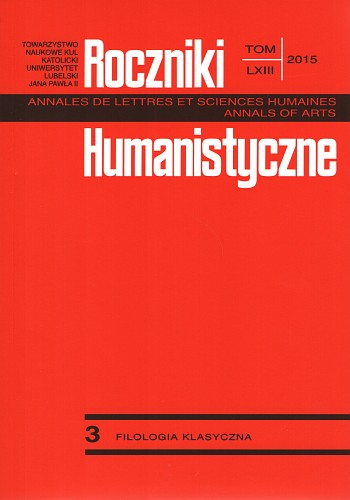Cognomen „Mus” w plebejskim rodzie Decjuszów
The cognomen „Mus” in the plebeian family of the Decii
Author(s): Krzysztof MogielnickiSubject(s): Philology
Published by: Towarzystwo Naukowe KUL & Katolicki Uniwersytet Lubelski Jana Pawła II
Keywords: Decii Mures;gens Decia;Roman cognomina;Roman culture;onomastics
Summary/Abstract: The aim of the paper is the reexamination of the sources concerning the plebeian gens Decia to find a convincing explanation for the fact that one branch of this family was given the surname of “Mus”. At the beginning, two previous explanations of the enigmatic name’s origin are criticized. Firstly, I object to the interpretation of Laurens F. Janssen, who connects the animal surname to a devotio ritual performed by Publius Decius during the battle at Veseris in 340 B.C. Secondly, counter-arguments are presented against Jacques Heurgon’s opinion that there might be an etiological legend in the Livy’s description of the courageous exploits of P. Decius, the tribune of 343 B.C. The next, proper part of the article constitutes an attempt at a wider description of the factors which may have led to the creation of the cognomen “Mus”. To begin with, the remaining Roman aitiological legends, explaining the origin of surnames in certain families, are recalled. Moreover, an attempt is made to determine, at what time Decii were called “mices”. At last, I introduce the significance of the rodent in the Roman culture, which refers to the daily life and among which is usage of the word “mouse” as an invective. I eventually try to argue that Publius Decius (cos. 340 B.C.) received the cognomen due to his political connection with influential plebeians of the fourth century B.C.
Journal: Roczniki Humanistyczne
- Issue Year: 63/2015
- Issue No: 03
- Page Range: 67-89
- Page Count: 23
- Language: Polish

